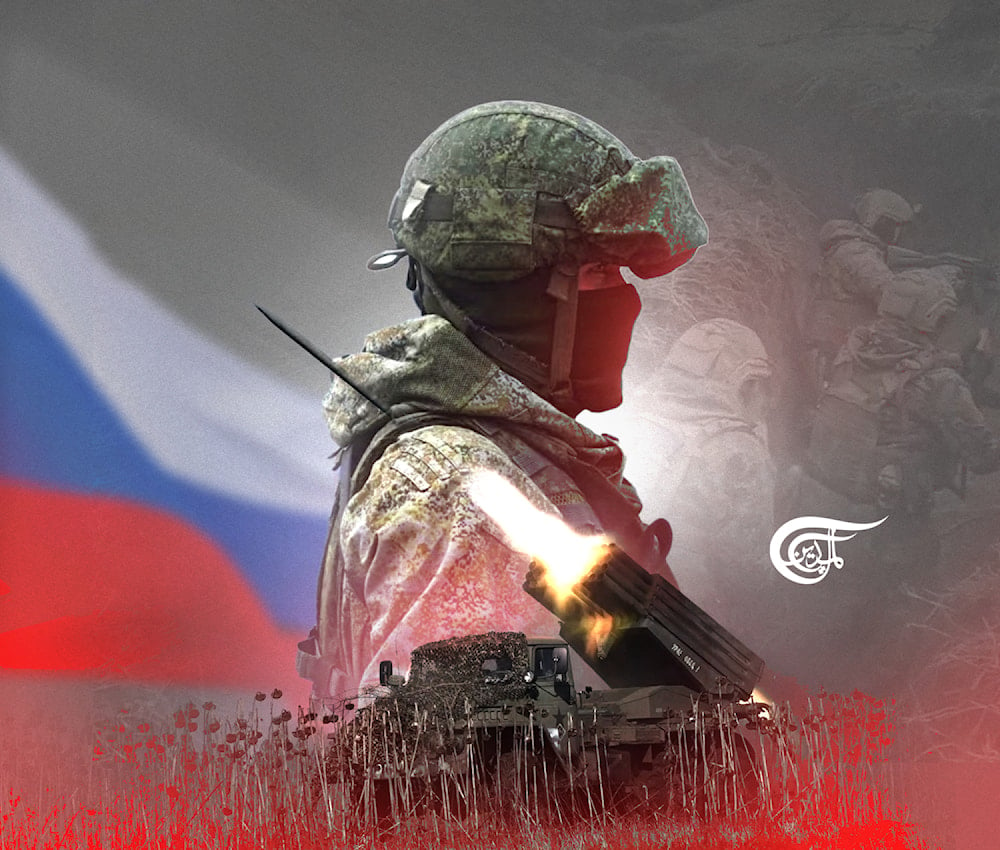The Art of War: Different Thinking Systems
Just as the West failed to understand Russia, and was taken by surprise, so it is that the White House firmly ignores the Biblical ‘End of Times’ dimension to the Israeli ‘way of thinking about war’.
-

The Art of War: Different Thinking Systems (Illustrated by Mahdi Rteil to Al Mayadeen English)
Jacques Baud, a Swiss military officer with a long history of studying ‘Ways of Thinking’ about War (from Warsaw Pact to NATO -- to which he was seconded by his government), has written a new book -- The Russian Art of War: How the West Led Ukraine to Defeat. His book theme is essentially: Others understand the West, better than the West understands ‘Them’.
Baud writes that the fundamental reason for the West having the ‘blinkers on’ is “the result of an approach we have already seen in waves of terrorist attacks — the adversary is so stupidly demonized that we refrain from understanding his way of thinking. As a result, we are unable to develop strategies, articulate our forces, or even equip them for the realities of war”.
“In the West, we tend to focus on [the immediate] moment and try to see how it might evolve. We want an immediate response to the situation we see - today. The idea that “from the understanding of how the crisis arose comes the way to resolve it” is totally foreign to the West. In September 2023, an English-speaking journalist even pulled out the “duck test” for me: “if it looks like a duck, swims like a duck and quacks like a duck, it’s probably a duck.” In other words, all the West needs to assess a situation is an image that fits their prejudices. Reality is much more subtle than the duck model ...”.
“The reason the Russians are better than the West in Ukraine is that they see the conflict as an [organic] process; whereas we see it as a series of separate discrete actions. The Russians see events as a film. We see them as photographs. They see the forest, while we focus on the trees. That is why we place the start of the Ukraine conflict on February 24, 2022 - or the start of the Palestinian conflict on October 7, 2023. We ignore the contexts that bother us and wage conflicts we do not understand. That is why we lose our wars …”.
Baud, in his book, gives an excellent account of the military evolution derived from this western ‘thinking system’. Nonetheless, the explanation is somehow incomplete. Yes, the ‘Others’ do have an ‘organic’ and ‘process’-linked understanding of crises, yet there is more to it than that.
The French philosopher, Emmanuel Todd, in La Défaite, suggests that -- with a US in constant revolt against its own past – the West has fallen to nihilism and to “a breath-taking dogmatism across the spectrum of Western élites - a kind of ideological solipsism preventing them from seeing the world - as it actually is”.
I recall having once asked former Secretary Madeline Albright why she forbade Yasser Arafat from consulting various Islamic authorities on the radical US proposal to divide the sovereignty under Al-Aqsa Mosque horizontally, so that the topsoil sovereignty would stay with the Islamic Waqf, but the ‘beneath’ would be Israel’s sovereignty. She said firmly that it was a matter of principle at the US State Department to ignore all religious dimensions – and to remain secular.
There are other examples: Dick Cheney insisted that all that was needed in geo-politics was to understand ‘the underlying nature of people’ (as viewed from the Western perspective). Facts and history did not matter. As Baud has noted, an image that fits with prejudice is what matters.
The consequence is not confined to that of failing to see the world ‘as it actually is’, but represents an ideological teleology of refusing to see it ‘as it is’.
Baud writes at length why the West has been systematically surprised by Russia in Ukraine, and observes how this deep-seated prejudice gives Russia the advantage of surprise -- to the point “where the Western narrative led Ukraine to totally underestimate Russian capabilities, which was a major factor in its defeat”.
The key point is that Baud’s insights apply not only to the implementation of military action, as such. They are also applicable as a ‘thinking system’ to mis-construing geo-politics, too.
Just as the West failed to understand Russia, and was taken by surprise, so it is that the White House firmly ignores the Biblical ‘End of Times’ dimension to the Israeli ‘way of thinking about war’, preferring to stick with its ‘liberal-secular’ image of "Israel".
So too, the West refuses to understand the Palestinian and Resistance opposition to Zionism, and as Baud observes, “it is an approach we have already seen in waves of terrorist attacks - the adversary is so stupidly demonized that we refrain from understanding his way of thinking”.
The West thus slips back into old default colonial tactical responses to what they observe (i.e. towards the Iraq’s Hash’d A-Shaabi, or Ansarallah in Yemen), viewing them merely as ‘rebel’ or ‘mutinous’ disconnected eruptions, to be put down with a firm smack of firepower -- i.e. as discontinuous, tactical events.
There is then, no real enquiry into the reasons for these irritating neo-colonial irruptions, nor any interest in whether there is history to them.
Jacques Baud concludes: As a result of this approach, our frustrations are translated by unscrupulous media into narratives that both feed hatred and increase the sense of vulnerability.

 Alastair Crooke
Alastair Crooke
 4 Min Read
4 Min Read











